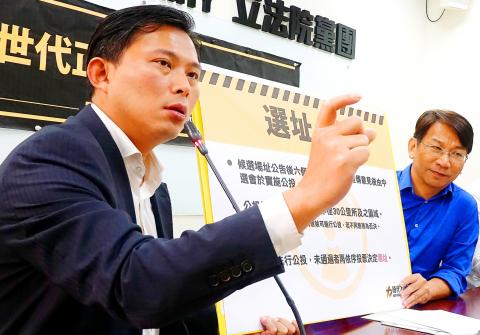The New Power Party (NPP) yesterday proposed a bill that would require the government to establish a nuclear waste management committee and build an interim repository to ensure more centralized and safer management of radioactive waste.
Under the proposed radioactive waste management act, the committee would be an independent government body under the Executive Yuan and would follow a set of procedures for selecting the storage site that ensures neutrality and public participation, the party told a news conference at its caucus office in Taipei.
Nuclear waste is scattered in various locations across the nation, with low-level radioactive waste stored in a repository on Orchid Island (Lanyu, 蘭嶼) and many spent fuel rods stored at nuclear power plants, NPP Executive Chairman Huang Kuo-chang (黃國昌) said.

Photo: Chu Pei-hsiung, Taipei Times
“Taiwan is a small island. Should we have so many storage facilities at the same time? Such an approach to nuclear waste management is not only irresponsible, but it also raises safety concerns,” he said.
Before the government finalizes a plan for the final disposal of spent nuclear fuel, where the waste would be stored for tens of thousands of years, it should first build an interim repository that could keep the waste for several decades, he said.
Under the bill, the location of the interim repository must be selected by experts and civil groups, pass an environmental impact assessment and a local referendum, he said
Experts would select 10 locations based on their geographical conditions and from them civil groups would select three, he said, adding that residents living within a 30km radius of the selected location would then vote in a referendum on whether to build the repository.
The process would be “based on professional assessment, and ensure transparency and public participation,” he said.
Under the bill, the committee responsible for overseeing the process should have a chairman and six other members, he said, adding that there should be at least one Aboriginal member.
The chairman, nominated by the Executive Yuan, must be approved by the Legislative Yuan, he said.
“The management of nuclear waste is not only an environmental issue, but also one of generational justice,” NPP caucus convener Hsu Yung-ming (徐永明) said.
“The government has long ignored the importance of public participation and transparency when building nuclear power plants, but we think it is important to ensure those two things occur in the process,” he added, urging the public to support the bill.

Tropical Storm Gaemi strengthened into a typhoon at 2pm yesterday, and could make landfall in Yilan County tomorrow, the Central Weather Administration (CWA) said yesterday. The agency was scheduled to issue a sea warning at 11:30pm yesterday, and could issue a land warning later today. Gaemi was moving north-northwest at 4kph, carrying maximum sustained winds near its center of up to 118.8kph and gusts of 154.8kph. The circumference is forecast to reach eastern Taiwan tomorrow morning, with the center making landfall in Yilan County later that night before departing from the north coast, CWA weather forecaster Kuan Shin-ping (官欣平) said yesterday. Uncertainty remains and

SEA WARNING LIKELY: The storm, named Gaemi, could become a moderate typhoon on Wednesday or Thursday, with the Taipei City Government preparing for flooding A tropical depression east of the Philippines developed into a tropical storm named Gaemi at 2pm yesterday, and was moving toward eastern Taiwan, the Central Weather Administration (CWA) said. Gaemi could begin to affect Taiwan proper on Tuesday, lasting until Friday, and could develop into a moderate typhoon on Wednesday or Thursday, it said. A sea warning for Gaemi could be issued as early as Tuesday morning, it added. Gaemi, the third tropical storm in the Pacific Ocean this typhoon season, is projected to begin moving northwest today, and be closest to Taiwan on Wednesday or Thursday, the agency said. Today, there would likely

DISRUPTIONS: The high-speed rail is to operate as normal, while several airlines either canceled flights or announced early departures or late arrivals Schools and offices in 15 cities and counties are to be closed today due to Typhoon Gaemi, local governments announced last night. The 15 are: Taipei, New Taipei City, Taoyuan, Tainan, Keelung, Hsinchu and Kaohsiung, as well as Yilan, Hualien, Hsinchu, Miaoli, Chiayi, Pingtung, Penghu and Lienchiang counties. People should brace for torrential rainfall brought by the storm, with its center forecast to make landfall on the east coast between tonight and tomorrow morning, the Central Weather Administration (CWA) said. The agency issued a sea warning for the typhoon at 11:30pm on Monday, followed by a land warning at 11:30am yesterday. As of

CASUALTY: A 70-year-old woman was killed by a falling tree in Kaohsiung as the premier warned all government agencies to remain on high alert for the next 24 hours Schools and offices nationwide are to be closed for a second day today as Typhoon Gaemi crosses over the nation, bringing torrential rain and whipping winds. Gaemi was forecast to make landfall late last night. From Tuesday night, its outer band brought substantial rainfall and strong winds to the nation. As of 6:15pm last night, the typhoon’s center was 20km southeast of Hualien County, Central Weather Administration (CWA) data showed. It was moving at 19kph and had a radius of 250km. As of 3pm yesterday, one woman had died, while 58 people were injured, the Central Emergency Operation Center said. The 70-year-old